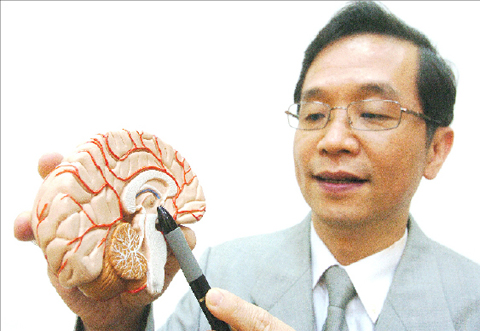The unemployment rate rose to a new high of 5.81 percent last month as more companies closed their doors or laid off workers to cope with the economic downturn, the Directorate-General of Budget, Accounting and Statistics (DGBAS) said yesterday.
On a more optimistic note, however, the statistics agency said some industries appeared to have hit bottom.
The headline unemployment rate gained 0.06 percentage points to 5.81 percent, or 630,000 people, last month, the highest level since DGBAS initiated the survey 31 years ago, the agency’s monthly report showed.

PHOTO: CHANG CHIA-MING, TAIPEI TIMES
The seasonally adjusted index increased 0.09 percentage points to 5.72 percent, higher than forecasts by UBS and Citigroup Taiwan Inc. The two banks put the rate at 5.6 percent.
“The labor market remains tough,” DGBAS Deputy Director Huang Jiann-jong (黃建中) told a media briefing. “While the unemployment rate continued rising in March, the rise slackened to a seven-month low.”
An additional 15,000 people lost their jobs in business closures or downsizing last month, Huang said, adding that the number of people working less than 16 hours a week had dropped by 27,000 amid a rush of orders from China.
The unemployment rate would have reached 6.21 percent if the government had not added 890,000 contract workers to its payroll, bringing employees in the public sector to 1.04 million, the report said.
The broad unemployment rate was 7.4 percent, up from 7.32 percent a month earlier, if non-workers such as students and housewives were included, the report said.
People aged between 45 and 64 accounted for 141,000 unemployed — an increase of 56,000, or 66 percent, from a year ago — the highest increase among all age groups, Huang said, calling attention to their predicament as many are breadwinners.
The official said the unemployment pointer would head higher in coming months when college graduates are expected to enter the market, starting next month.
“It would be better to look at the figure after seasonal adjustment,” Huang said. “The issue is not so grave if the index remains stable.”
Kevin Hsiao (蕭正義), head of UBS Wealth Management Research in Taiwan, said college graduates would have difficulty finding jobs this year.
“The economy is not expected to turn the corner until the fourth quarter and firms will not hire new workers in the absence of a robust recovery,” Hsiao said by telephone.
Polaris Research Institute (寶華綜合經究院) president Liang Kuo-yuan (梁國源) said the job market contracted for 22 months during the last downturn and that losses would be heavier losses this time around, given the severity of the crisis.
In a related development, the nominal take-home salary averaged NT$35,314 (US$1,044) per month in February, up from NT$35,130 in January, ending a downward trend in the previous four months, DGBAS said in a separate report yesterday.
However, the figures shrank by 12.13 percent in the first two months, if bonuses and dividends were also factored in, the report said.

TAKING STOCK: A Taiwanese cookware firm in Vietnam urged customers to assess inventory or place orders early so shipments can reach the US while tariffs are paused Taiwanese businesses in Vietnam are exploring alternatives after the White House imposed a 46 percent import duty on Vietnamese goods, following US President Donald Trump’s announcement of “reciprocal” tariffs on the US’ trading partners. Lo Shih-liang (羅世良), chairman of Brico Industry Co (裕茂工業), a Taiwanese company that manufactures cast iron cookware and stove components in Vietnam, said that more than 40 percent of his business was tied to the US market, describing the constant US policy shifts as an emotional roller coaster. “I work during the day and stay up all night watching the news. I’ve been following US news until 3am

Six years ago, LVMH’s billionaire CEO Bernard Arnault and US President Donald Trump cut the blue ribbon on a factory in rural Texas that would make designer handbags for Louis Vuitton, one of the world’s best-known luxury brands. However, since the high-profile opening, the factory has faced a host of problems limiting production, 11 former Louis Vuitton employees said. The site has consistently ranked among the worst-performing for Louis Vuitton globally, “significantly” underperforming other facilities, said three former Louis Vuitton workers and a senior industry source, who cited internal rankings shared with staff. The plant’s problems — which have not

TARIFF CONCERNS: The chipmaker cited global uncertainty from US tariffs and a weakening economic outlook, but said its Singapore expansion remains on track Vanguard International Semiconductor Corp (世界先進), a foundry service provider specializing in producing power management and display driver chips, yesterday withdrew its full-year revenue projection of moderate growth for this year, as escalating US tariff tensions raised uncertainty and concern about a potential economic recession. The Hsinchu-based chipmaker in February said revenues this year would grow mildly from last year based on improving supply chain inventory levels and market demand. At the time, it also anticipated gradual quarter revenue growth. However, the US’ sweeping tariff policy has upended the industry’s supply chains and weakened economic prospects for the world economy, it said. “Now

COLLABORATION: Given Taiwan’s key position in global supply chains, the US firm is discussing strategies with local partners and clients to deal with global uncertainties Advanced Micro Devices Inc (AMD) yesterday said it is meeting with local ecosystem partners, including Taiwan Semiconductor Manufacturing Co (TSMC, 台積電), to discuss strategies, including long-term manufacturing, to navigate uncertainties such as US tariffs, as Taiwan occupies an important position in global supply chains. AMD chief executive officer Lisa Su (蘇姿丰) told reporters that Taiwan is an important part of the chip designer’s ecosystem and she is discussing with partners and customers in Taiwan to forge strong collaborations on different areas during this critical period. AMD has just become the first artificial-intelligence (AI) server chip customer of TSMC to utilize its advanced